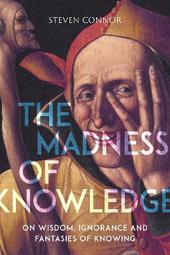
|
The Madness of Knowledge: On Wisdom, Ignorance and Fantasies of Knowing
Hardback
Main Details
| Title |
The Madness of Knowledge: On Wisdom, Ignorance and Fantasies of Knowing
|
| Authors and Contributors |
By (author) Steven Connor
|
| Physical Properties |
| Format:Hardback | | Pages:320 | | Dimensions(mm): Height 234,Width 156 |
|
| Category/Genre | Philosophy - epistemology and theory of knowledge |
|---|
| ISBN/Barcode |
9781789140729
|
| Classifications | Dewey:121 |
|---|
| Audience | | Postgraduate, Research & Scholarly | |
|---|
|
Publishing Details |
| Publisher |
Reaktion Books
|
| Imprint |
Reaktion Books
|
| Publication Date |
15 April 2019 |
| Publication Country |
United Kingdom
|
Description
Many human beings have considered the powers and the limits of human knowledge, but few have wondered about the power that the idea of knowledge has over us. Steven Connor's The Madness of Knowledge is the first book to investigate this emotional inner life of knowledge - the lusts, fantasies, dreams, and fears that the idea of knowing provokes. There are in-depth discussions of the imperious will to know, of Freud's epistemophilia (or love of knowledge), and the curiously insistent links between madness, magical thinking, and the desire for knowledge. Connor also probes secrets and revelations, quarreling and the history of quizzes and "general knowledge," charlatanry and pretension, both the violent disdain and the sanctification of the stupid, as well as the emotional investment in the spaces and places of knowledge, from the study to the library. In an age of artificial intelligence, alternative facts, and mistrust of truth, The Madness of Knowledge offers an opulent, enlarging, and sometimes unnerving psychopathology of intellectual life.
Author Biography
Steven Connor is the Grace 2 Professor of English and director of the Centre for Research in Arts, Social Sciences and Humanities (CRASSH) at the University of Cambridge. He is the author of many books, including The Book of Skin, Fly, The Matter of Air: Science and the Art of the Ethereal, A Philosophy of Sport, and Beyond Words: Sobs, Hums, Stutters and Other Vocalizations, all also published by Reaktion Books.
Reviews"It is quite safe to say that Connor's study is original and should be of interest to philosophers, intellectual and cultural historians, and literary scholars, as well as basically anyone who is interested in 'epistemopathic' aspects of knowledge. . . . As an admirably erudite scholar, Connor delves effortlessly into the storehouse of Western thought, equally at ease discussing the ideas of such luminaries as Plato, Francis Bacon, John Milton, Schopenhauer, Nietzsche, Sigmund Freud, and other psychoanalysts as well as James Joyce and Samuel Beckett."-- "Isis Journal" "Pinning down this wide-ranging book is difficult, but 'psycho-literary history of ideas about knowledge' may not be too far off. . . . Connor interrogates fictional, philosophical, religious, historical, and other texts to examine the relationships they suggest between knowledge, or the search thereof, and passion, madness, fantasy, and power. Many long passages connect myriad sources and incidents through their common use of a single word or concept. This sometimes looks like the exploratory wordplay that Continental philosophers often use in lieu of an argument or a thesis, but there is more substance here than this comparison may suggest, and the work offers some useful synthetic insights. Though those looking for an analytical, conceptually based central argument may be frustrated, Connor is relatively clear in defining his terms, framing and organizing his remarks, and establishing connections between old and new points--even if these still at times seem to form a chain of individually connected thoughts rather than a web with a definite center. Recommended."-- "Choice" "The Madness of Knowledge challenges the casual belief that there is a thing 'out there, ' solid and observable, which we more or less manage to cram into our brains. . . . Connor's argument--regardless of their truth, our beliefs about knowledge operate in a world of fantasy--is in itself both clear and convincing."-- "Times Literary Supplement"
|